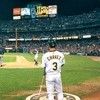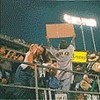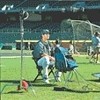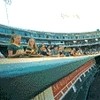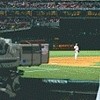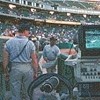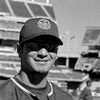One late afternoon last month, about an hour after the Oakland Athletics had won their eighteenth straight game, third baseman Eric Chavez zapped on two mammoth-sized television sets in his Lafayette living room, sank into a sofa beside his perfectly blonde girlfriend, and watched his boyhood idol Barry Bonds slowly swagger his way up to the plate.
The 24-year-old had recently purchased the screens to accommodate his friends and teammates for video-game tournaments at the house; up to twelve guys could play at one time, he notes. Today the thumbs were idle: His roommate, Mark Mulder, who’d pitched earlier in the day and had been relieved in the ninth inning after giving up two home runs, was sulking, his chin pressed to his chest as he spread out his lanky frame on another couch. Mark Ellis, the team’s rookie second baseman, sat on the floor eating a bowl of cereal. And Chavez’ youthful-looking mother, Ruby, up for the weekend from their home in San Diego, was reclining in a leather chair, bare feet up. All of them were basking in the glow of the great Giant, who was waddling his short black bat back and forth on the dual screens, waiting for a good pitch.

Outstanding in his field: Chavez has moved up fast, with mixed results, but he seems to embody our romantic notions about baseball. Credits: Mark Gartland 
Members of the A’s colorful and enthusiastic fan base cheer their team during its recent 20-game winning streak. Credits: Mark Gartland 
If the price for chumming with reporters is a moment’s inconvenience, then the payoff for Chavy has been four seasons’ worth of positive coverage. Credits: Mark Gartland 
Fans arrive early at the Coliseum and stand behind the A’s dugout hoping to talk with the players. Credits: Mark Gartland 
“Eric was the most talented kid I’d ever seen,” says his former coach. “He was also the absolute opposite of an extrovert on the bench.” Credits: Mark Gartland 
So if baseball is all a big lie, then at least it’s a good one. Without a guy like Chavy, what fun would it be? Credits: Mark Gartland 
We support Chavez because he plays the game as we like to think we’d play it: not just for ourselves, but for the glory of baseball, or whatever’s left of it. Credits: Mark Gartland
Chavez’ girlfriend squinted. “Is he wearing an earring?”
“That’s his trademark,” said Chavez.
“His trademark?”
“Yeah, his trademark. Something he’s known for.”
For the casual A’s fan, Eric Cesar Chavez has his own trademark: an array of creative facial-hair designs that include a goatee, soul patch, long chops — the strategy changes every few days. But for those who follow every game, hang on every pitch, and read every quote, Chavez is affectionately known as Chavy, the rising star whose roller-coaster performance at the plate keeps them riveted — if frustrated — but always rooting for him. At any moment in the game, Chavy is capable of bashing a home run to the opposite field or, just as easily, swinging stupidly at curve ball near his ankles; consistency has not yet suited him.
Yet he plays to his fans with a sense of modesty that the gruffs at the local bar admire, and he wins over the press with his accessibility and candor. And his youth and good looks have attracted cadres of adoring young women out to the Coliseum. Today, though, he looked like just another fan rooting for his hero — and he was. Sacked out in front of the televisions, he wore an old baseball cap backwards, a T-shirt with the Charlie Tuna logo on the front, loose blue jeans, and Adidas sneakers. “That’s the one guy when I made it to the big leagues I was afraid to meet,” he said, shaking his remote at Bonds. “I didn’t want to look him in the eye. I didn’t want to know what my face would look like when I finally met him.”
As Bonds took a few outside pitches for balls, Chavez explained how he’d worshiped the left fielder growing up. It was surprising, in a way, since the two players approach the game on completely different terms, and as a result, their fan-approval ratings poke at polar opposites. For the much-maligned slugger on the big screens, the fans are superfluous and the press is the enemy. Bonds rejects the romanticized myth of baseball, and sees it plainly as a business. “When you come to the ballpark, you’re walking into a place that is all deception and lies,” he told The New York Times Magazine in a recent profile.
Chavez is exactly the opposite. For him, baseball is still a game, a kid’s “dream come true,” he says. While Barry Bonds shuns reporters, Chavez invites them over. And while Bonds eschews any romantic notions of the sport, Chavy embodies them. In his short career to date, perhaps the most consistent part of his game is the one he’s mastered off the field.
It’s a fine skill, and one that raises a good question. If being a baseball fan today means participating in a world of “deception and lies” then doesn’t it make sense to root for a good guy? Someone we like, and someone who likes us?
Someone like Chavy?
To get a glimpse of the game that takes place off the field requires a walk down the narrow corridor leading to the A’s clubhouse. You hear it first: loud hipster music clashing with televisions tuned to ESPN highlights. Then you smell it: the dirt, sour body odor, and muggy carpets. Finally, you see it: a tiny horseshoe-shaped room crowded with thirty athletes in underwear and flip-flops. Reporters, mostly male and dressed in their own uniform of khakis, golf shirts, and goatees, hang out in a tight cluster near the entrance like boys at a middle-school dance, hoping to make eye contact with players — awaiting the nod that says it’s okay to come over and ask questions.
Chavy’s locker is located just to the left of the entrance, a few feet from the reporters’ dugout. The location has benefits for both sides. The third baseman has a reputation for being accessible and giving great off-the-cuff quotes; reporters, in turn, have spared Chavez the poison pen. Consider the abysmal run in July when he went 0-for-23. Any other ballplayer might have shunned reporters and hidden behind a shield of clichés like “I’m just gonna go out there, day in and day out, and hope for the best.” Instead, Chavy put himself out there: “I’m getting in the batter’s box and swinging at the first pitch because I just want to get it over with. I don’t feel comfortable up there,” he told the beat reporters, who dutifully reported the quote with empathy.
It’s a working contract that’s unwritten, but not unrecognized. Last season Chavez received the annual award from beat reporters for accessibility and crisp quotes — and that was a year in which then-teammate Jason Giambi was telling reporters: “My personal motto is ‘Swing like an All-Star, party like a rock star, and fuck like a porn star.’ “
The first time I met him, Chavez was walking around in baggy shorts and stirrup socks pulled up to his knees like a soccer player, putting in an order for new batting gloves and bats, and thumbing through fan mail. He slapped the empty seat next to his locker without looking up and said, “Here, man, take a seat.”
At the ballpark, Chavez is a fidgety guy, a contrast to his normal laid-back San Diego demeanor. He periodically runs his hand through his dark-brown hair, and when he talks, he wags a heel or bounces a knee or twists his fingertips — sometimes all three at once. He’s got the attention span of a 90 mph fastball from mound to mitt, which in his profession is a positive quality. When told I’d be watching him for a week, he laughed, “I’m not sure you want to do that!” Then, just as quickly, he asked, “Okay, what do you need?”
It’s this kind of openness that makes Chavez a media favorite. If the price for chumming with reporters is a moment’s inconvenience and the occasional misquote, then the payoff for Chavy has been four seasons’ worth of positive coverage. He couldn’t recall a single instance where he got rocked by a columnist, going back even to his pitiful rookie season. He did, however, complain about the way the press recently treated Terrence Long, one of his closer friends on the team. Long had started the season with a case of the butterfingers in the outfield. Reporters used Long’s struggles as fodder for their columns, calling for a replacement or trade — and then stayed clear of his locker, Chavez said. Later, after the speedy outfielder ended a game in Boston with an extraordinary running catch into the stands — stopping a home run and saving the game — reporters returned to Long’s locker hoping for quotes. “Just a few weeks earlier they were kinda crushing him, saying he was this and that,” Chavez said, “and then the next day they were asking him how he’s making such great catches? I didn’t like that.”
Even when Chavez performs poorly or the team is losing, his good deeds tend to earn a sentence or two. Chavez is a .273 hitter (a few points below the league average), and he’s gone through two lengthy droughts without getting a hit this year. Yet if he made an “incredible play” or hit a “towering home run” in the second inning that had no outcome on the final result, it didn’t matter; he’d get ink anyway.
In the game that finally broke the A’s winning streak, a 6-0 loss to the Minnesota Twins, locals scribes even accounted for what heroics Chavez nearly achieved. Early in the game he hit a foul ball that swung wide of the right field pole. From the televised replay, it was obvious Chavez knew it was foul when he hit it; he trotted halfway up the first base line slowly, grimaced, and returned to the batter’s box. Strike two. But in the first sentence of the next day’s Chronicle story, it was much more than an errant swing: “Eric Chavez’ near-home run in the third inning drifted foul by several inches.”
One broadcaster who covers Chavez daily acknowledges that the young player has the opposite problem from Bonds: The press likes Chavez so much they cushion him from his blows and even build him into something he isn’t. “We like him,” the broadcaster said. “He talks to us, so the papers write about him, and we keep interviewing him. But first and foremost, he’s just a nice guy — and he deserves everything he’s getting.”
Thirty minutes after a recent game, Jim Young, the A’s head of media relations, was trotting through the tunnels of the Coliseum, ushering Chavez to yet another sit-down television interview. Fans want more of Chavy now, and with the playoffs coming up, his press time will only increase. After the eccentric pitcher Barry Zito, Chavez fields the most interview requests on the team. He’s become a sort of a symbol of the club’s persona: young, carefree, and probably more talented than he should be, given his salary — $675,000 this year — and the fact that he’s one of the team’s most familiar faces. As a consequence, the big marketers are also flocking for Chavy, but he’s held off on the endorsements so far. “That’s like the last thing on my mind,” he told the San Francisco Business Journal this spring. “All I’m concerned about is winning.”
Chavez was in his typical post-game rush mode, but agreed to the interview and followed Young into a large banquet room where lights, camera, and an empty chair awaited. Young then turned and returned to the clubhouse.
The camera guy pinned a microphone on Chavez’ shirt and handed him an earpiece. As the tech attempted to get the equipment working, Chavez was impatient, and his knee took off in a torrid bounce. You could see his mind envisioning the streams of cars crawling up Highway 24 and into the Caldecott Tunnel. Finally, the cameraman said he’d have to run downstairs, and directed Chavez to listen for a voice in the earpiece, and when he heard it, to just look into the camera and answer the questions.
“Well, this isn’t the most glamorous part of the job,” said the player, trapped in his chair, sweating that clean post-shower sweat beneath his backwards cap while waiting for the voice of the media gods. Welcome to the show, kid.
After a few minutes of silence, Chavez started talking about the game. He was fuming. The A’s had won, but only after they’d been forced into a come-from-behind victory that he thought the team could have avoided. Chavez believed manager Art Howe should have called on closer Billy Koch to pitch the final inning instead of letting a weary Mulder attempt the win. “We’ve got one of the best closers in the game,” Chavez said. “We should’ve used him.”
Players are trained like dogs not to publicly criticize, or even hint at slighting teammates, much less their superiors. Chavez’ comments whiffed of second-guessing Howe’s decision, and that kind of talk can have damning consequences, punishable by fines or, far worse, being ostracized by your teammates. Chavez knew the dangers: On his first day in the big leagues in 1998, in his very first interview with the local press, he said he looked forward to competing for the starting job, even though there were two veterans entrenched in front of him. The next day, Chavez’ teammates hazed him by taping cardboard blinders to the bill of his cap, and they laid down the law: When you talk to the media, you only talk about yourself. Unless, of course, you’re heaping praise.
But now I had to wonder if Chavez was opening up only because I had finally become a familiar face, or, more likely, was it because I wasn’t a television reporter, and he didn’t have to be quite as guarded? “Mark wasn’t sharp today,” he continued, still shaking his head. “Everybody on the bench knew it; he shouldn’t have been out there.”
Just wait, I thought, until the camera goes on. He’ll offer a softer quote, and steer clear from publicly critiquing his manager’s decision.
When the questions finally started coming through the earpiece, Chavez raised his voice. The first few questions focused on the winning streak. Chavy responded that he and his teammates weren’t thinking about any records; they were more worried about the impending baseball strike. Then there was a question about management’s decision to ban cell phones and video games from the locker room. “We’re all grown men here,” Chavez told the camera, airing his disagreement. “Personally, I don’t think those steps need to be taken. The team’s winning.”
Finally, the big question: What were you thinking when Mulder went out there to close the game?
There were guys on the bench who were upset about it, he said, and he was one of them. Mark didn’t have his best stuff today, and we’ve got one of the best closers in the game. “Mark shouldn’t have been out there,” he said.
After the lights and camera had turned off, Chavez removed his earpiece and glanced back at the big lens. “I don’t even know who I was talking to,” he said.
The truth is, Eric Chavez knows exactly who’s he’s talking to when he looks into a camera — us. Unlike his hero Barry Bonds, he puts a high premium on this relationship, and he’s willing to allow us along for the ride, even if it gets him in trouble.
“I answer questions because I don’t mind answering how I’m feeling when reporters ask me right after a game,” he told me. “I look at it from a fan’s perspective: Would they want to know the honest truth? Yeah. So I’m honest. You may not always like what I have to say, but I’m honest.”
Another example of how good media relations pay off came following a game during the A’s record-winning streak. Chavez was the night’s undisputed hero by any measure, and the media scrubs were particularly hungry for his words. With the score tied in the eighth against the Twins, Chavez came to bat with two outs and the bases loaded. The pitcher had intentionally walked Miguel Tejada to get to Chavez, which is considered a dis’ in baseball. What’s more, the pitcher was a southpaw, and Chavez’ batting average is much lower against lefties — opposing teams are quick to exploit this weakness.
Up in the press booth, professional protocol forbids cheering or rooting of any kind. And with 42,000 fans screaming on all sides, protocol makes the press booth an empty, painfully repressed place to sit at times like these. Most of these men and women are clearly baseball fans as well, but they are compelled to uncomfortably deny their impulses to holler and clap.
Chavez’ name was announced and, as usual, a shriek of female voices preceded the deep roar of the Coliseum. The Twins’ pitcher threw a fastball inside to Chavez, but Chavy turned on it and poked it just over the second baseman’s head to bring in the game-winning run. I felt my knee hit the tabletop, lifting a few laptops to my left, and stopped myself just before my hands clapped together. Chavez’ bat had shattered on the play, and the broadcasters marveled at his strength and coordination — broken-bat hits usually dribble along the infield grass for an easy out.
In the press elevator down to the locker room, the scribes talked openly about Chavez’ outstanding at-bat and seemed anxious to work him into their reports. “One inch the other way,” one reporter said, sounding suspiciously like a fan, “and that’s a grand slam.” In manager Howe’s office (a ritual pit stop for reporters), most of the questions focused on Chavez’ clutch hit; the manager said young Eric was showing the skills of a veteran by getting that ball out of the infield at a crucial moment.
But when the expectant reporters reached the clubhouse, the A’s media-relations guy Jim Young stood by Chavy’s locker and spoke in a tone that signified bad news: “Eric Chavez has left the building.”
“That little prick,” huffed one reporter, slapping his notebook into his hip. Deprived of Chavez, the writers listed toward leadoff man Ray Durham, who’d certainly been enjoying a hot bat, but whose accomplishments fell well short of the night’s true drama. Durham, a happy-go-lucky type, was pleased to see them. Then they waddled over toward pitcher Cory Lidle, who’d started the game and ended his own streak of 43 innings without giving up an earned run, even though he’d been pulled from the game before the contest was won. He would nonetheless be the next day’s story. Later, Chavez told me he’d hustled out of the locker room only because the Coliseum scheduled a post-game fireworks show, and he wanted to avoid the traffic jam. He then scanned the papers early the next morning, wondering how the writers might punish him. Faithful readers of the sports pages know that when Barry Bonds ditches reporters or declines an interview, a telling little sentence usually appears: “Bonds refused to talk to reporters after the game.” For Chavez, there was no such snip. “I knew I pissed them off,” Chavez said. “So I was expecting them to take a little dig at me, write something that said I got out of there without talking to them.
“But they didn’t,” he added, sounding surprised.
They wouldn’t dare. In this sport, they don’t write smack about you if you’re modest. And when you talk to Chavy’s friends, family, and teammates, that’s how they describe him. He’s competitive and talented — they say that a lot — also sensitive, self-assured, self-critical, generous, and a little naive. But it always comes back to modesty, the golden characteristic baseball fans value most in their players. We don’t like arrogance; that’s basketball.
Chavez’ parents Ruby and Cesar moved the family to San Diego from Los Angeles after Cesar’s job transferred them to the more expensive city in the late 1970s. Ruby worked as a security guard at Eric’s high school. “We didn’t have a lot of money when the kids were growing up,” Ruby said. “We always had food on the table, but we were paycheck to paycheck.” So for cheap entertainment, the family spent a lot of time at parks, playing sports. Eric, the second of four kids, took to baseball with ease and carried the all-important competitive fire.
In high school, Eric’s athletic talent “was like a men among boys,” says his old coach, Steve Edwards. “Eric was the most athletically talented kid I’d ever seen. He was also the absolute opposite of an extrovert on the bench. He was as soft-spoken as they came.”
Like many, when Edwards talks about Chavez, he gushes. “It was just so clear that this kid, with his talent, was going to go on to do big, big, things.” Scouts showed up at games during Eric’s junior year and then told him they weren’t sold on his speed. “So Eric goes out and says, ‘I’m stealing bases this year,’ ” the coach recalls, “and winds up breaking the league record with 53. That started a trend. Every time they said Eric Chavez couldn’t do something, he goes out and does it.”
Just after Chavez graduated, he was picked tenth overall in the amateur draft by the A’s, an ego-inducing event if ever there was one, and then spent only two years blowing through the minors before the team called him up late in 1998. The rapidity of the rise surprised him. “I wouldn’t do it differently, but they brought me up too quick. There were too many expectations that I couldn’t meet.” At 21, he was the team’s youngest rookie starter since Rickey Henderson in 1980. Even before he took a swing that season, reporters, prodded by the organization’s marketing arm, were touting Chavez as a Rookie of the Year candidate.
It was his first taste of the media machine, and the outcome wasn’t good — a warning sign that even positive ink may have its drawbacks. As MLB.com later reported, “Chavez believed the hype” and, lacking a strong work ethic, he flailed in the first half of the season with a .167 batting average, a nightmare even for a rookie. Ruby recalls the year painfully. “You could tell,” she said, hunching her shoulders tight, “he was stressin’ when he walked up to the plate all season. He stopped calling us, didn’t talk to us as much.” She looked over at her son sitting on the couch. “He keeps a lot of things inside. He won’t tell us what’s going on sometimes, but that year he wasn’t telling us anything.”
You can read the kid, though. Part of the fun of watching Ruby’s son perform comes from watching the subtle expressions his face takes on during the three-hour contest. Any careful observer can divine his thoughts from the look on his face. Ruby, the ultimate Chavy observer, says she can tell from moment to moment if her son is stressed, relaxed, or idling somewhere in between. Each high-stakes moment of concern is greeted by a brief, “oh, God” roll of the eyes; every big hit delivered in crunch time is punctuated with a “phew” smile when he reaches first base.
For the rookie, however, those smiles were proving hard to come by. But then something changed in the young player that somehow gave him his confidence back. At the All-Star break, Chavez told A’s announcer Ray Fosse that he wanted his name pronounced properly: “SHA-vez,” not “CHA-vez.” Afterwards, he went on a tear, lifting his overall average to a more-respectable .247. It was a minor tweak, perhaps entirely mental, but it was one of those mysterious baseball remedies that helped him solidify his position both with himself and with his growing legion of supporters. “Eric put a lot of pressure on himself in those early years,” says Howe, Chavez’ only major league coach. “Being a number-one pick, those kinds of pressures came with the territory. … But he’s come a long way.”
As Chavez returned for his second season, his batting had come around, but his fielding was still amateur. Growing up, he’d played only shortstop, but with Tejada entrenched there the team moved Chavez to third base. The new job proved a difficult transition; when right-handed hitters came to the plate, Chavez was now looking at their shoulders, which made him the last person in the park to see whether the ball was coming at him — and it was coming fast, too. After he stumbled with errors, scouts declared that Chavez couldn’t field. Then last season, in another dramatic turnaround, he won the Gold Glove award, bestowed on the player with the best defensive skills at his position. Chavez hadn’t expected the honor. “Those awards usually go to guys who’ve been around awhile,” he told reporters in his understated fashion. “I didn’t think it was coming to me.”
Although Chavez may not have responded directly to his critics, his come-from-behind performances certainly silenced them. But is silence good for a guy like Chavy? If anything, his past shows that he’s motivated by criticism to improve his game. Perhaps he’d be belting out fifty homers a season, or winning another Gold Glove if the beat reporters and columnists who cover him daily held him to a higher standard.
The one continual dig on Chavez when reporters do get honest with him is that his game is temperamental, connected to either his youth or a crisis of self-doubt or both. At the same time, that may be one reason we root for him. The difficulty fans have in gauging his skills makes him interesting, more human. Is he a truly mediocre player who only gets hot late in the season? Or is he a hot player who plays mediocre early on? Chavy, too, is befuddled by his bumpy ride. “It goes in phases. Sometime I’m like this,” he says, bringing his hand above his head. “And sometimes I’m like this,” he adds, dropping his hand to his thigh. “I just don’t know how to explain it.”
Still, the sport’s pundits are convinced Chavez will ultimately find his rhythm and become one of the game’s great stars. Peter Gammons, baseball’s celebrity scribe, wrote in his ESPN.com column last year, “Now that Chavez is the best defensive third baseman in the American League, if I would have one third baseman in either league around whom I could build a team, it would be Chavez.” Gammons also believes Chavez and shortstop Tejada could become the greatest left side of the infield “of all time.”
Last year, Chavez hit 32 homers, with 114 runs batted in — above-average stats that put him well on his way to stardom. Slumping early this season, he required an incredible September to catch up, but Chavy finished well. As of this writing, he’d hit 34 home runs and was close to his previous season’s RBI total. But he also struck out 115 times, the most of his career. Two years haven’t made him consistent, Chavez said, but a few more probably will. “When I flatline, that’s when I’ll start putting up performance standards. Because right now, I still don’t know what I’m capable of.”
Chavy’s contract with the A’s expires after the 2003 season, and he says he wants to play his entire career in Oakland: The clubhouse is great, the fans are swell, and the location superb. If he keeps improving, though, management might not be able to afford him. God forbid he hits forty home runs and nears a .300 batting average next season — at age 25. He’ll command millions just as the A’s are negotiating a new contract with Tejada, an electrifying player who is a candidate for the league’s Most Valuable Player award this year.
And when it comes contract time, the Athletics’ management is unlikely to be swayed by fan sentiment or Chavy’s off-the-field cachet. They’ll be looking mainly at the stats, and his abilities as a player are still an open question.
But as long as Chavez sticks around, at least his gut sense of authenticity will squeak into the papers, and he’ll give us fans a taste of the lifestyle we so crave. When Bonds told the Times Magazine “There’s nothing truthful at the ballpark, except the game,” he may well be right, but baseball as a business would struggle to survive without guys like Chavez, who speak regularly and openly, who still buy into our silly romantic notions, and who, as fans themselves, try and bring us along for the ride. Even if the scribes turn on Chavez at some point down the road, which is likely, he has already created a deep imprint with his Oakland fans. We’ll support him, and wonder about him, because he plays the game as we like to think we’d play it: not just for ourselves, but for the glory of baseball — or whatever is left of it.
So if baseball is all a big lie, then at least it’s a good one. Without guys like Chavy, what fun would it be? If we accept players only for their on-field statistical output, as Bonds seems to want us to do, then we’d be reduced to watching empty uniforms run the bases, appreciative only when they break records. It’s the personality inside those uniforms that we’re really watching, and that’s why it was more thrilling to watch a guy nicknamed Chavy muscle out a broken-bat single in the bottom of the eighth inning to extend his team’s winning streak than it was to see Barry Bonds quite predictably hit his 600th home run.
After batting practice a few weeks ago, one serious Chavy fan had an appointment for an interview. Melissa Bergman, twelve, had won a contest through the A’s to have a sit-down with her favorite player. Unlike the reporters who cover the team and are forced to stifle their inner fandom, Melissa arrived at her interview wearing an A’s cap covered in Chavez pins, green A’s pants, and green shoes with gold “A’s” finger-painted on the toes. “After Jason left, Chavy became my favorite player,” she said while waiting for Chavez behind the batting cage. “He wears the same number as me.”
“He’s the best A’s third baseman since Carney Lansford,” added her Uncle Ron. “Just look at him. Looks like he was born to play.”
Chavez trotted over in his warm-up jersey and sunglasses, sporting the full beard today. He took a seat with Melissa on the bench as the other A’s filed into the locker room. Kids above the dugout were shouting, “Chavy! Sign my ball! Chavy! Sign my hat! Chavy!” Melissa put a tape recorder between herself and her favorite player.
Chavez has been interviewed countless times, and his questioner today was conducting her first. The meeting was about as contrived as meetings get, but still, how else to bring fans closer their heroes?
Melissa started off with some softballs, and Chavez played to his audience with good, clean answers.
What’s your favorite thing about baseball?
“My teammates. Playing with them. It’s a team sport.”
What was it like when you got to the big leagues?
“It was my dream. Incredible.”
What do you like to do besides play baseball?
“Play video games.”
But when it got down to the nitty-gritty, when it came time for Melissa to tighten the screws and press him on what was most important to her, what she really wanted to know, what she needed to hear him say, she fired away:
If the New York Yankees offered you more money to go play for them, would you take it, and if so, why?
“Nah,” Chavy said, bouncing his knee. “I wouldn’t play for them.”
“Good answer,” said the fan.
It wouldn’t show up in his stats, but Eric Chavez had just hit yet another home run.

